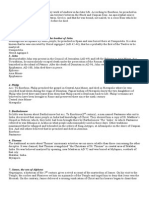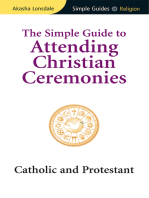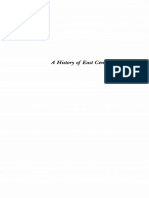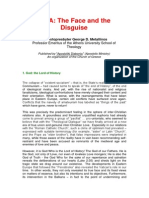Reviewer in Araling Panlipunan III
Reviewer in Araling Panlipunan III
Uploaded by
Jerez OrayleCopyright:
Available Formats
Reviewer in Araling Panlipunan III
Reviewer in Araling Panlipunan III
Uploaded by
Jerez OrayleOriginal Description:
Copyright
Available Formats
Share this document
Did you find this document useful?
Is this content inappropriate?
Copyright:
Available Formats
Reviewer in Araling Panlipunan III
Reviewer in Araling Panlipunan III
Uploaded by
Jerez OrayleCopyright:
Available Formats
REVIEWER IN ARALING PANLIPUNAN III
#ryanrivr
CHAPTER 11:AGE OF FAITH Middle Ages or The Medieval Period > Refers to the thousand years between ancient times and modern era. > Period between the fall of Rome in A.D.476 and the discovery of America in 15th century. medius aevum > Latin word means middle. > Latin word means period or age. Division of European History: Constantinople > Ancient > capital city > Medieval > Modern Dark Ages the Christian church and feudalism > Fall of Rome > 2 institution filled in the void left by > refers to the 1st century after the fall of Roman Empire. Rome. cultural concept > An institution which is a functional configuration of cultural patterns, including actions, ideas, and attitudes, which possess a certain permanence and id intended to satisfy human needs. harmony decadent > Form of order > When the whole institutional setup is not harmonious. Barbaric The reasons why Barbaric tribes go to > uncivilized people Rome: > over population Art and Literature > climate > wiped out when Barbaric came. > outcast Characteristics of Barbaric: Germanic or Teutonic tribes > drunkard > Moved to Gaul, Spain and Italy, they > love to fight did not enslave or exterminate the people > gambler they found there instead they live with the people they found there. Teutons Goths > Indo-European peoples. They were > First barbarians to penetrate into the regarded as barbarians by Romans and Roman Empire. Greeks. > Occupied the valley of Danube and the northern shore of Black Sea. 2 branches of Goths: > the Visigoths (West Goths) > the Ostrogoths (East Goths) Northmen > tribes in the north. Teutonic Tribes: (V.F.L.A.B.S) > Vandals > Burgundians > Lombards > Franks > Angles > Saxons > Jutes Odin > the chief of their gods. Thor > god of thunder
Germanic tribes > rough and ignorant > lived in tribes under a chief > laws were mostly based on superstitious and tribal customs
> fierce and warlike > worshipped Scandinavian gods > few members could write or read 416 > Visigoths invaded Spain 480 > Franks set up kingdom in Gaul (now France and Belgium) Christian Church > Main civilizing force of the Middle Ages > The force that saved European civilization Clovis > Leader of Franks Charles Martel (a.k.a Charles the Hammer) > Appointed as mayor by Clovis > Lead the fight against Muslims this battle was called Battle of Tours that takes place in 732. Muslims lost Pepin the Short > Child of Charles Martel > called Pepin the short because of his height. Charle Magne > Son of Pepin the short > Emperor A.D 768.
A.D 400 > Germanic tribes began invading the Roman territories. 450 > Angles, Jutes and Saxons began to settle in Britain. 489 > Ostrogoths invaded Italy. Franks > Establish the Merovigian Dynasty
Cleotilde > Wife of Clovis 4 names called to the Muslims: > Mours > Moslim > Turks > Mohameddan Papal States > Donation of Pepin to the church.
Treaty of Verdun > Division of Rome to the 3 grandsons of Charle Magne. Mars and Jupiter > Official state gods. They no longer offer security and hope, people turned to other religions for comfort. One such religion was Christianity. Emperor Constantine > Christian leader > Under the leadership of this emperor Christianity finally won acceptance until it became the religion throughout the empire. Jesus Rulers of the Jews: > Christianity began with him > Babylonians > Born in Bethlehem in 4 B.C. > Assyrians > His message brought hope to the Jews. > Persians > He is the Messiah. > Romans Messiah Judaism > A Hebrew word means Lords annointed > Religion of the Jews. one. Pontius Pilate > Jews reported to him that Jesus was scheming to > The Roman governor of Judea. Become king of the Jews. Christianity Christ > became the almost universal religion of > means the anointed one or the Europe. Messiah. Pope -> Cardinals -> Archbishops -> Bishops -> Priests Pope Cardinals > head of the church > Together they are college of cardinals, they elect the next pope.
Pope Leo III > crowned Charle Magne as the 1st Emperor of Holy Roman Empire on Dec 25, 800 A.D. Grandsons of Charle Magne: > Lothair > Charles the Bald > Charles
Archbishops > In charge of several bishops. In 4th century A.D. the most important diocese are: > Rome > Constantinople > Alexandria > Antioch
Bishops > has own diocese or bishopric. Bishop of Rome (Pope) > emerge as the leader and heir to the authority of St. Peter. St. Peter > The chief of the apostles of Christ.
Jesus gave his mantle of authority to St. Peter and Said: Thou art Peter and upon this rock I will build my church. A.D. 1100 Pope > Bishop of Rome exclusively takes the > A word derived from papas means title of Pope. father. th 5 century - A.D. 445 Church is like that an empire because it > a decree was issued declaring the has: Supremacy of the Bishop of Rome over > Its own system of laws > Its own taxes the whole church. > Its own courts ** collects 10% on all produce from land. Clergy Priest > exempted from paying. > Only people who did not pay taxes. Canon Law Patriarch > Law of the Church > Leading church official in Constantinople. Ecumenical Patriarch Catholic > Church leader of the world. > meaning universal. The Catholic Church The Greek Orthodox Church > The Christian church in the West. > The Christian church in the East. > headed by the pope > headed by the patriarch. Constantine Edict of Milan > His battle credited to Christianity. > issued by Constantine in A.D. 313, giving st > 1 Roman Emperor to officially Christianity a rank equal to that of any recognize Christianity. religion in the Roman Empire. Emperor Theodosius I 4 Factors explain why the church > He made Christianity the only religion attained a dominant position: of the empire. 1. It taught that salvation depended on its sacraments. 2. It had the only strong authority in the Church Sacraments: empire. > Baptism > Penance 3. It controlled education. > Confirmation > Extreme Unction 4. It controlled land ownership. > Holy Eucharist > Holy Orders > Marriage Extreme Unction Schools setup in: > a sacrament in which a priest prays for > Monasteries and touches with oil a person who is > Cathedrals dying or is in danger of death. > Parishes Churchmen Latin > Most of educated men in Europe. > The language of the church. Abbot Activities of those in monasteries: > Greek word means father. > Working > Praying > Sleeping Monks Writings of Cicero, Caesar and Ovid > Became great Christian teacher. > Copied by the monks in beautiful illuminated manuscripts. Monasticism Monasteries had first appeared in: > Way of life of the monks. > Egypt > Syria
St. Benedict > Italian monk > Organized a monastery and drew a set of rules to regulate the monks lives. Abbey Church > Center of each monastery, with a tall, massive tower rising behind it. Novices > Newly accepted members of monasteries. Large abbey > can accommodate 200 persons.
Regula > means one rule Benedictine Rule > Vows of poverty, chastity and obedience. Cloister > The main court is by this where monks walked and meditated. Infirmary > clinic/medical center Great Schism > splitting of Greek Orthodox Church and Catholic Church. **Many lords gave land to the church in hopes of increasing their chances of being spiritually saved. Truce with God > Sponsored reforms by the church states that the knights should not fight during Lent, Christmas, Easter, and from Wednesday evening to Monday evening each week.
Medieval Churches > acquired much land in Western Europe. Lombards > A Germanic tribe that settled in Po Valley in Italy and gave a strip of their land to the pope. In hoc signo vinces > By this sign you shall conquer. Excommunicate Tuesday Dungeon > Ultimate power of the church > Day of fighting > jail > To cut a man off from God and Loaf bread condemn his soul to eternal torment. > Use as plate in early times. Salt Pope Gregory VII > Use to preserve meats in early times. > He excommunicates King Henry IV. Henry IV > German king, Defied the Truce with God. > Walked barefoot to the popes place at Canossa in the Italian Alps, Dressed in humble garb, and ask Pope Gregorys forgiveness. 11th century Crusades > The Turks who were Muslims gained > A movement that organized by Pope control of the Eastern Mediterranean Urban II and the main goal is recover the including Jerusalem. Jerusalem from Turks. The people who joined this movement: Crusaders > Call to the people who join the crusade. > Knights > Monks > Children > Peasants > Women
1095 Rewards of Pope Urban II to the peasant > Pope Urban II called counsel at who will train to be a knight: Clermont, in France and argued the 1. The land you are tilting will be yours. people to take up arms to recover the 2. All your depth will be abolish. Holy Land from the 3. Economic Aid Turks. **The crusaders failed to recover the Holy Land. Literature, Religion and Art England London > Showed the influences of the church on > Country with many > This city alone had the lives of the people. churches. 120 churches. Churches 2 styles of the church: > The peoples expression of their > Romanesque devotion to God. > Gothic Romanesque Church > Adapted from the Roman architecture. > Characterized by solid structures, thick walls, and small arches.
Gothic Church **The Cathedrals had stained glass > Developed from the Romanesque style. windows which told stories about Jesus, > More delicate structure and had more Mary, and other holy personages. windows, giving plenty of light to the High Church Official church interiors. > Usually head of the university. > Had wing like bridges of stone called University flying buttresses, which connected to > comes from the Latin term universus. the walls to supports standing on the **All the university students wore black ground outside the church. gowns similar to those of the clergy. Black Gowns > Reminding us of the medieval practice in higher education. University of Paris Course offered in University of Paris: th > Founded during the 12 century (M.A.R.L.G.A.G) > Model of other universities > Logic > Arithmetic > Grammar > Geometry **The university students enrolled for > Rhetoric > Music 4 years and they graduated > Astrology Bachelor of Arts Degree > When they completed their course they will graduated with this degree. Philosophy of Scholasticism > Another contribution of the medieval church to civilization. > Combined reason and faith. Masters Degree > When they study for another six years at the school of theology, medicine or law and completed it they will obtained this degree. St. Thomas Aquinas > Was largely responsible for scholasticism. > He taught that Aristotelian logic could be used to help a person better understand his faith.
You might also like
- Chapter 1 - Religion in The Middle AgesDocument12 pagesChapter 1 - Religion in The Middle Agesapi-299495412No ratings yet
- Articolo RES ReviewedDocument21 pagesArticolo RES ReviewedFr Jesmond MicallefNo ratings yet
- 31 Cyprian of CarthageDocument15 pages31 Cyprian of Carthageaeons-roNo ratings yet
- Interview of Patriarch of Jerusalem Irenaeus To The National Herald, N. York, March 15 (24pages)Document24 pagesInterview of Patriarch of Jerusalem Irenaeus To The National Herald, N. York, March 15 (24pages)Ireneos ArchimandriteNo ratings yet
- Aidan Nichols - Theology in The Russian Diaspora - Church, Fathers, Eucharist in Nikolai Afanas'ev (1893-1966) (2008) PDFDocument312 pagesAidan Nichols - Theology in The Russian Diaspora - Church, Fathers, Eucharist in Nikolai Afanas'ev (1893-1966) (2008) PDFDaniel Carrasco Bascuñán100% (2)
- Byzantine History NotesDocument22 pagesByzantine History NotesCatherineNo ratings yet
- The Roman Catholic Church in Medieval Europe TextDocument13 pagesThe Roman Catholic Church in Medieval Europe Textapi-233464494No ratings yet
- Group 1 RSDocument35 pagesGroup 1 RSIsmael PivoNo ratings yet
- The Rise and Spread of ChristianityDocument30 pagesThe Rise and Spread of ChristianityJennica Caraig Arjona100% (1)
- World History CHAPTER 9 11Document20 pagesWorld History CHAPTER 9 11Juliana Mae FabrigarNo ratings yet
- 2 Reading The Roman Catholic Church in MedievaDocument5 pages2 Reading The Roman Catholic Church in MedievaWilliam WebbNo ratings yet
- CH 14 Sec 1 - Church Reform and The CrusadesDocument7 pagesCH 14 Sec 1 - Church Reform and The CrusadesMrEHsieh100% (1)
- Part Iv-History of The Church Lesson 21 The Early Christian ChurchDocument11 pagesPart Iv-History of The Church Lesson 21 The Early Christian ChurchsamsungloverNo ratings yet
- Early Christian - F I N A LDocument106 pagesEarly Christian - F I N A Lanon_453092758No ratings yet
- ch14 1Document7 pagesch14 1Juanmaseta100% (1)
- Church HistoryDocument26 pagesChurch Historyfatherkline100% (1)
- The Martyrdom of The ApostlesDocument4 pagesThe Martyrdom of The ApostlesJudy MarciaNo ratings yet
- The Church's Pilgrimage According To Christopher Dawson: ND RDDocument8 pagesThe Church's Pilgrimage According To Christopher Dawson: ND RDKenjie Gomez EneranNo ratings yet
- Manual Compendium of The Bible Henry H. HalleyDocument47 pagesManual Compendium of The Bible Henry H. HalleyScribdTranslationsNo ratings yet
- 01 Religion and Culture in Medieval EuropeDocument10 pages01 Religion and Culture in Medieval EuropeMrUnaxius 7No ratings yet
- Christianity in Roman Britain - WikipediaDocument14 pagesChristianity in Roman Britain - Wikipedianoumangill1900No ratings yet
- H&ss #3 #6 - The Church Reform and The CrusadesDocument8 pagesH&ss #3 #6 - The Church Reform and The CrusadesGaloNo ratings yet
- UntitledDocument6 pagesUntitledPhoebe Kate VillanuevaNo ratings yet
- Christianity: Introduction To World ReligionDocument52 pagesChristianity: Introduction To World Religionfroilan gomez100% (1)
- Ch. 13 The Rise of ChristianityDocument33 pagesCh. 13 The Rise of Christianity子龙李No ratings yet
- RE 3 - Module 21 - Christianity in The Middle Ages 1 - 14 FontDocument6 pagesRE 3 - Module 21 - Christianity in The Middle Ages 1 - 14 FontJhianne EstacojaNo ratings yet
- Ancient Rome and Illiria Some DetailsDocument8 pagesAncient Rome and Illiria Some DetailsDeni MarcuNo ratings yet
- Ancient Rome and Illiria Some DetailsDocument8 pagesAncient Rome and Illiria Some DetailsDeni MarcuNo ratings yet
- Brief History of Catholic Church PDFDocument48 pagesBrief History of Catholic Church PDFKaito ChanNo ratings yet
- 100 Key Events in Church HistoryDocument8 pages100 Key Events in Church HistoryDorin Rus100% (3)
- Lesson-10the Church History - Early Church, DiscensionsDocument14 pagesLesson-10the Church History - Early Church, DiscensionsEmmalyn Patindol100% (1)
- Treachery SystemDocument3 pagesTreachery SystemCherryl Kaye M. DupitasNo ratings yet
- I Short Question and Answers:-: Medieval Europe - Christianity and The Roman Church History Chapter - 2Document6 pagesI Short Question and Answers:-: Medieval Europe - Christianity and The Roman Church History Chapter - 2Ronnith NandyNo ratings yet
- Stages of The History of The Church ESTDocument99 pagesStages of The History of The Church ESTGweeenchanaNo ratings yet
- Byzantine Empire NOTESDocument32 pagesByzantine Empire NOTESwprice2No ratings yet
- Kosztin ÁRPÁD, The Daco-Rroman LegendDocument69 pagesKosztin ÁRPÁD, The Daco-Rroman Legenddracones26100% (2)
- 100 Most Important Events in Church HistoryDocument79 pages100 Most Important Events in Church HistoryMatt KodattNo ratings yet
- Ambrose (Early Christianity)Document7 pagesAmbrose (Early Christianity)joykumarNo ratings yet
- Rve ReviewerDocument5 pagesRve Reviewerニール シルベラNo ratings yet
- Angel Anne Alcantara Gas 12 A (Itwr) AssignmentDocument4 pagesAngel Anne Alcantara Gas 12 A (Itwr) AssignmentAngel Anne AlcantaraNo ratings yet
- Chapter 8Document6 pagesChapter 8Nael Malic Yabo GantalaoNo ratings yet
- Reviewer The ChurchDocument5 pagesReviewer The Churchjoshua tauroNo ratings yet
- Unit 5 (Middle Ages) : - 500 CE - 1500 CE in Europe. - Also Called The Medieval Period or Dark AgesDocument77 pagesUnit 5 (Middle Ages) : - 500 CE - 1500 CE in Europe. - Also Called The Medieval Period or Dark AgesHans PeterNo ratings yet
- ChurchHistoryRev2 11Document7 pagesChurchHistoryRev2 11karpov19830% (1)
- Chapter 8-1Document6 pagesChapter 8-1Nael Malic Yabo GantalaoNo ratings yet
- The CrusadesDocument30 pagesThe Crusadesapi-294843376No ratings yet
- The Rise and Decline of The Medieval ChurchDocument24 pagesThe Rise and Decline of The Medieval ChurchJowee Andrei ClemenoNo ratings yet
- Summaries Chapter7 11Document17 pagesSummaries Chapter7 11Sean D.No ratings yet
- Callahan. Ademar of Chabannes and His Insertions Into Bede's 'Expositio Actuum Apostolorum'. 1993.Document16 pagesCallahan. Ademar of Chabannes and His Insertions Into Bede's 'Expositio Actuum Apostolorum'. 1993.Venerabilis Bedae StudiosusNo ratings yet
- Middle AgesDocument3 pagesMiddle Ages202330072No ratings yet
- The Church Fathers by Dr. Paul ChungDocument30 pagesThe Church Fathers by Dr. Paul ChungBiruk TewoldeNo ratings yet
- Church HistoryDocument17 pagesChurch HistorySer Oca Dumlao LptNo ratings yet
- 2023ASF 4 - Module 1Document25 pages2023ASF 4 - Module 1Perez JemaicaNo ratings yet
- Medieval Church HistoryDocument72 pagesMedieval Church HistorySAC MarathahalliNo ratings yet
- Phase 1: Persecution by The JewsDocument44 pagesPhase 1: Persecution by The Jews김나연No ratings yet
- The Third AgeDocument18 pagesThe Third AgeCamille IlaoNo ratings yet
- A Look at The Early ChurchDocument8 pagesA Look at The Early Churchnalishebo100% (1)
- Essential Question: - What Were The Causes & Effects of The Crusades?Document30 pagesEssential Question: - What Were The Causes & Effects of The Crusades?johnNo ratings yet
- Catholic Church HistoryDocument12 pagesCatholic Church HistoryTristan Duane Garcia Lacson100% (1)
- Chapter 10 Weebly NotesDocument21 pagesChapter 10 Weebly Notesapi-244140508No ratings yet
- Fr. Tony SummaryDocument41 pagesFr. Tony SummaryCaylan Neumeran Villajuan DarioNo ratings yet
- Simple Guide to Attending Christian Ceremonies: Catholic and ProtestantFrom EverandSimple Guide to Attending Christian Ceremonies: Catholic and ProtestantNo ratings yet
- "From East To West May The Name of The Lord Be Praised": Mr. Pablo Cuadra Religion ClassDocument18 pages"From East To West May The Name of The Lord Be Praised": Mr. Pablo Cuadra Religion ClassAina Maree Eusebio SiasonNo ratings yet
- A History of The Christian Councils, From The Original Documents, Vol. 1 To The Close of The Council of Nicaea, A.D. 325, Charles HefeleDocument526 pagesA History of The Christian Councils, From The Original Documents, Vol. 1 To The Close of The Council of Nicaea, A.D. 325, Charles HefeleDavid Bailey100% (3)
- Church Organization and CompostionDocument8 pagesChurch Organization and CompostionAngiemarie AmpongNo ratings yet
- Daikin Unification Risorgimento1969Document10 pagesDaikin Unification Risorgimento1969barberousseNo ratings yet
- Ecclesiastical Differences Between The Catholic Church and The Eastern OrthodoxDocument19 pagesEcclesiastical Differences Between The Catholic Church and The Eastern OrthodoxXm146mdhdkc I1gsjissksns82No ratings yet
- Resurrection Mode 0000 I GnaDocument100 pagesResurrection Mode 0000 I GnaHaytham KhouryNo ratings yet
- Christian Art - (4. The Christian Orient)Document7 pagesChristian Art - (4. The Christian Orient)iosebi kkNo ratings yet
- FR Metallinos-UNIA - The Face and The DisguiseDocument28 pagesFR Metallinos-UNIA - The Face and The Disguisest i100% (1)
- 3the Tension of Hesychia (Stillness) - PEMPTOUSIADocument5 pages3the Tension of Hesychia (Stillness) - PEMPTOUSIARintuMathunniNo ratings yet
- Class Activity The Byzantine EmpireDocument4 pagesClass Activity The Byzantine EmpireI love yoongiNo ratings yet
- Encyclical of The Eastern Patriarchs 1848Document12 pagesEncyclical of The Eastern Patriarchs 1848joelhaas100% (1)
- Charles Jelavich - Barbara Jelavich - The Establishment of The Balkan National States, 1804-1920-University of Washington Press (1986)Document374 pagesCharles Jelavich - Barbara Jelavich - The Establishment of The Balkan National States, 1804-1920-University of Washington Press (1986)floriinaaNo ratings yet
- Week 9 11 Intro To WorldDocument15 pagesWeek 9 11 Intro To WorldDrea TheanaNo ratings yet
- The Second Council of Nicea, 787Document95 pagesThe Second Council of Nicea, 787cincational100% (1)
- Fisa Bibliografica PracticaDocument10 pagesFisa Bibliografica PracticaFlorin BadeaNo ratings yet
- Lesson 6 Notes ss5 PDFDocument20 pagesLesson 6 Notes ss5 PDFJeremiah LausaNo ratings yet
- Orthodox Councils and Synods - 9th To 19th CenturyDocument27 pagesOrthodox Councils and Synods - 9th To 19th CenturyFabio Lins LeiteNo ratings yet
- 2018-6 Feb - Mat-Div Lit Hymns - ST Photios of ConstantinopleDocument8 pages2018-6 Feb - Mat-Div Lit Hymns - ST Photios of ConstantinopleMarguerite PaizisNo ratings yet
- The Ecumenical Patriarchate (2014) PDFDocument14 pagesThe Ecumenical Patriarchate (2014) PDFvojinsekNo ratings yet
- Eastern Church Review Vol. 1 No. 4 1967Document70 pagesEastern Church Review Vol. 1 No. 4 1967Maja MarjanovicNo ratings yet
- Final Syllabus of HCDocument46 pagesFinal Syllabus of HCDeevan KumarNo ratings yet
- UNIA - The Face and The DisguiseDocument33 pagesUNIA - The Face and The DisguiseStrand PhilipsNo ratings yet
- Go C Demetri As 1935 Eng PDFDocument3 pagesGo C Demetri As 1935 Eng PDFPaul.chiritaNo ratings yet
- (Central European Medieval Studies) Dragoljub Marjanovic - Creating Memories in Late 8th-Century Byzantium - The Short History of Nikephoros of Constantinople-Amsterdam University Press (2018)Document251 pages(Central European Medieval Studies) Dragoljub Marjanovic - Creating Memories in Late 8th-Century Byzantium - The Short History of Nikephoros of Constantinople-Amsterdam University Press (2018)Rizky Damayanti OktaviaNo ratings yet
- Entry of Slavs Into ChristendomDocument91 pagesEntry of Slavs Into ChristendomMaya Marinkowitch100% (1)

























































































